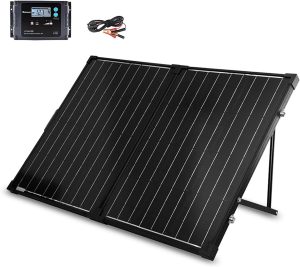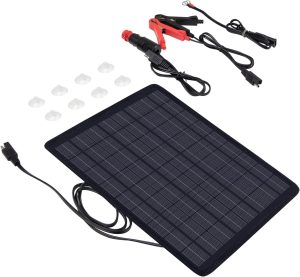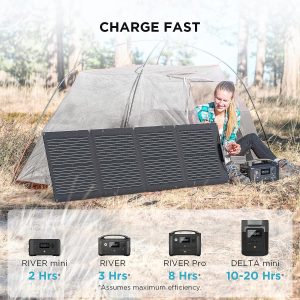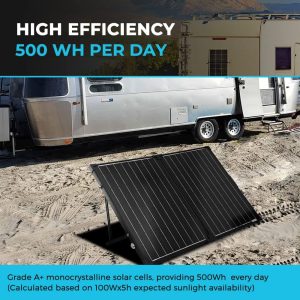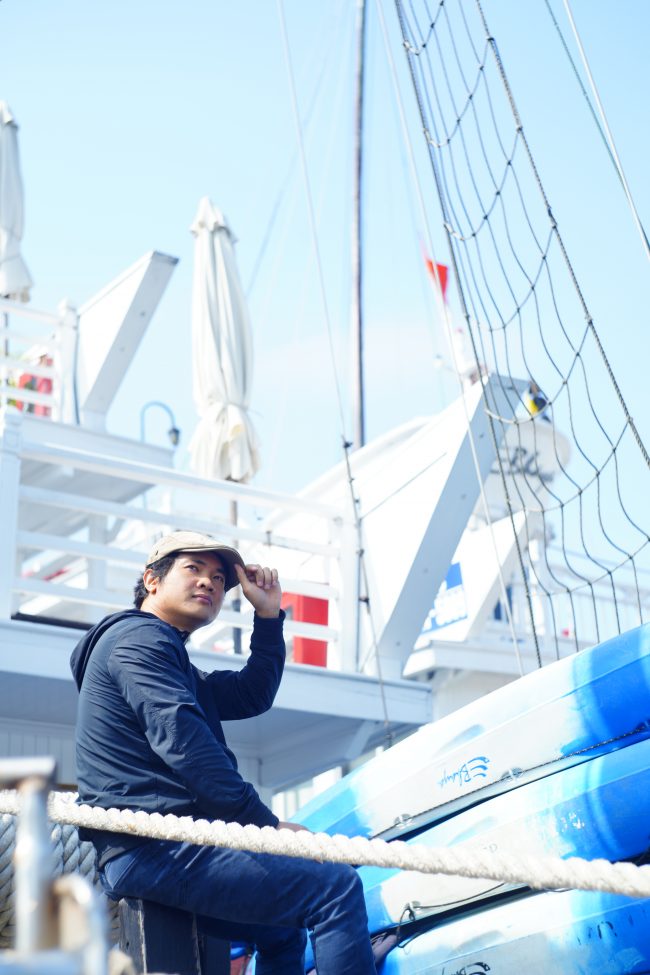If you are looking for a reliable and eco-friendly way to power your devices and appliances on the go, you might want to consider investing in a portable solar panel. Portable solar panels are lightweight, foldable, and easy to set up, and they can provide you with clean and renewable energy from the sun. Whether you need a solar panel for camping, RVing, boating, or emergency backup, there is a model that suits your needs and budget. In this blog post, we will compare some of the best portable solar panels available in 2023, based on their features, performance, and customer reviews. Here is a table that summarizes the main specifications and prices of the five products we will review:
| Product | Power | Weight | Dimensions | Output Ports | Price |
|---|---|---|---|---|---|
| Renogy 200W Monocrystalline Foldable Solar Panel with Waterproof Controller1 | 200W | 33.1 lbs | 35.6 x 25.9 x 3.1 inches (open) | 1 x USB-A, 1 x USB-C, 1 x DC, 1 x MC4 | $319.99 |
| Renogy 10W Solar Battery Trickle Charger Maintainer2 | 10W | 0.9 lbs | 13.19 x 9.29 x 0.2 inches (open) | 1 x SAE, 1 x Cigarette Lighter Plug, 1 x Alligator Clip, 1 x Ring Terminal | $29.99 |
| Portable Foldable Solar Panel with High Efficiency and Dustproof for Backyard3 | 110W | 13.2 lbs | 22 x 21 x 0.8 inches (open) | 1 x USB-A, 1 x USB-C PD, 1 x DC5521, 1 x MC4 to DC5525 Adapter Cable | $199.99 |
| LIPOWER Portable Solar Generator with Foldable Solar Panel MARS-10004 | 100W (panel) + 1000W (generator) | 27 lbs (panel) + 10.58 lbs (generator) | 22 x 16 x 3.75 inches (panel) + 11.8 x 7.5 x 7 inches (generator) | Panel: same as above; Generator: 3 x AC, 3 x USB-A, 1 x USB-C PD, 2 x DC5521, 1 x Car Port | $691 (with code ELECTREK) |
| Renogy 100 Watt Monocrystalline Foldable Portable Solar Suitcase with Waterproof Controller5 | 100W | 26.6 lbs | 24.8 x 20 x 2.8 inches (open) | Same as above plus a Voyager Charge Controller with LCD Screen and Temperature Sensor | $199.98 |
Renogy 200W Monocrystalline Foldable Solar Panel with Waterproof Controller
The Renogy 200-watt monocrystalline solar suitcase is a portable solar panel system designed to provide off-grid power. Equipped with an integrated PWM controller, this unit allows for efficient energy conversion and is ideal for camping, emergencies, or daily use.
Pros:
- High Output: Despite being rated at 200-watt, real-time output can reach up to 164 watts, depending on battery and conditions.
- Durable Construction: Many users praised the product’s high-quality build and durable materials.
- Portability: Comes with a heavy-duty canvas case, making it suitable for on-the-go applications.
- Flexible Setup: Long cable options (40, 80, 160 feet) allow for the panel to be positioned far from the power source.
- Reliable Over Time: Even after two years, the solar panel remains efficient.
- Multiple Connection Options: Works with different types of batteries and can be connected to various devices like the Bluetti EB55 Portable Power Station.
- Good Customer Support: Renogy’s tech support is knowledgeable and helpful.
Cons:
- B01 Error: Indicates a wire disconnect, which could be due to frayed wires at MC4 connectors or clips at the battery.
- Potential Wiring Issue: Factory connections might not follow the recommendation of connecting the battery first, which could risk frying the controller.
- Heavy and Fragile: Some users noted the product is somewhat bulky and should be handled with care.
- Wear Issues on 100-watt Panel: Some components, like the wires at MC4 connectors and controller, can fray over time.
- Controller Limitations: The built-in PWM controller may not maximize the panel’s potential output, leading some users to wish for an upgradeable MPPT option.
- Bag Zipper Issues: The zipper on the carrying bag can come apart, especially at the corners.
What People Say:
- Performance Satisfaction: Users are generally happy with the performance, noting that it works efficiently, especially when there’s adequate sunlight.
- Construction Quality: The suitcase is well-constructed, with a high-quality frame and paint. The controller, while functional, might be a weak link for some users.
- Clear Instructions Needed: Some users expressed concern about the factory connections, stating that better instructions would reduce potential mistakes during the setup.
- Versatility: Many find the solar suitcase versatile, using it for various applications like hiking, beach outings, or emergencies.
In summary, the Renogy 200-Watt Monocrystalline Solar Suitcase is a versatile and powerful off-grid power solution, though some users did face issues related to wear and controller limitations.
Renogy 10W Solar Battery Trickle Charger Maintainer
The Renogy Solar Car Battery Maintainer and Trickle Charger is a 10W solar panel designed to help maintain vehicle batteries by providing a steady stream of power when exposed to sunlight. It comes equipped with multiple connection options, including alligator clips, a cigarette lighter adapter, and eyelets for different battery types. The panel is housed in a fabric covering, with fold-out flaps that have suction cups, enabling users to secure it to the inside of a vehicle’s windscreen.
Pros:
- Effective in maintaining battery charge for some users, even with vehicles sitting idle for extended periods.
- Good build quality of the solar panel.
- Offers multiple connection options for diverse requirements.
- Fabric housing is safe for handling, as it does not get too hot in direct sunlight.
- Has shown good voltage output even in bright sunshine.
- Quick and accurate shipping as per one user.
Cons:
- Does not always deliver the promised 10W; some users reported averages of 6-8W.
- Some users found the provided cables, especially the alligator clips cable, to be too short.
- The product may not be completely waterproof given the cloth cover.
- Suction cups can be unreliable and might not hold the panel securely.
- Absence of a fuse in the provided cables can be a safety concern.
- Risk of overcharging and potential battery damage in bright conditions.
- Possible backward flow issues in low light conditions.
What People Say:
- The solar charger successfully rejuvenated batteries that were idle for months.
- It is effective in maintaining the charge of batteries exposed to sunlight for a few hours.
- Some users were disappointed with the output wattage, claiming it doesn’t always match the advertised 10W.
- The panel’s construction and materials, especially the suction cups, have garnered mixed reviews.
- Users recommend a charge controller to avoid potential battery damage.
- Concerns were raised about the product’s long-term durability, especially the outer fabric.
- Some found the product ineffective in locations or conditions with insufficient sunlight.
Portable Foldable Solar Panel with High Efficiency and Dustproof for Backyard
The EcoFlow 110W portable solar panel is designed for individuals seeking an alternative energy source, particularly those with limited space. The foldable design makes it easier to transport, and its integrated kickstand helps to position the panel effectively to capture sunlight. The panel is geared towards individuals who might be living in vans, trucks, or those who move frequently.
Pros:
- Integrated Kickstand: Helps users set up the panel without needing a rigid panel or any additional stands.
- Compact Design: Ideal for people with limited space such as van lifers.
- Customer Service: The company actively reaches out and works with customers to ensure satisfaction.
- Transportability: Designed for easy storage and movement, making it suitable for camping and other outdoor activities.
- Durability: Some users note that the product appears well-built.
Cons:
- Performance: Doesn’t always deliver on its rated power, achieving around 65% of the expected output.
- Expensive: The cost per watt makes this panel relatively pricier than its competitors.
- Durability Concerns: Some users have raised questions about the longevity of the panels, especially when exposed to intense heat.
- Missing Accessories: Multiple users reported not receiving the necessary cables with their panel.
- Need for Adjustments: Users may have to constantly adjust the panel’s position throughout the day to maximize energy capture.
What People Say:
- Customers appreciate the design features like the integrated kickstand, which makes setup easier.
- Performance-wise, users feel that the panel doesn’t live up to its rated power, often delivering less energy than expected.
- EcoFlow’s customer service is notable, with the company reaching out to users and helping address concerns.
- Missing cables and other accessories seem to be a recurring problem, frustrating many buyers.
- Some customers highlight concerns about the durability of the panel, especially when it becomes hot from sun exposure.
LIPOWER Portable Solar Generator with Foldable Solar Panel MARS-1000
The LIPOWER Mars-1000 Pro is a portable power station designed to provide emergency backup during blackouts, ideal for outdoor activities such as camping, and can be used for running a variety of electronic devices. Built with LiFePO4 (LFP) battery cells, it promises stability, a high number of charge cycles, and safety from overheating.
Pros:
- Longer Battery Life: Uses LFP battery cells which can be charged over 3000 times to 80% capacity, ensuring longevity.
- Safety: The LFP batteries are more stable and less prone to risks of explosion or fire.
- Versatility: Provides power for various devices from car fridges to small heaters.
- Portability: Designed to be compact and rugged, making it ideal for outdoor use.
- Multiple Charging Options: Can be charged using an AC wall plug, 12V car charger, and solar panels.
- Additional Features: Comes with a bright LED flashlight for emergencies.
Cons:
- Limited Information Display: The screen does not display power consumption, making it difficult to estimate battery life.
- Charging Limitations: While charging, some output ports are disabled.
- Limited Power Surge: While the Mars-1000 Pro has a 2000W power surge, other models offer more.
- Inefficient with Some Devices: For specific uses like CPAP machines, it might not last as long as advertised.
What People Say:
- Comparison with Similar Products: Some users compare it to similar models, such as the Delta 2. While the Mars-1000 Pro has certain advantages like being more straightforward, some models might offer more outlets or a faster charging rate.
- Usage for Specific Devices: Users have found it effective for running devices such as projectors, Nintendo switches, and portable car freezers. However, its performance with CPAP machines has mixed reviews.
- User-Friendliness: Generally considered user-friendly and reliable, especially for those who might not be tech-savvy.
- Concerns About Description Accuracy: Some feel the product description might be slightly misleading regarding the product’s capacity.
- Durability and Outdoor Use: Users have praised its rugged build and suitability for outdoor activities like camping.
Based on the reviews provided, the LIPOWER Mars-1000 Pro seems to be a versatile and reliable power station with certain limitations that potential buyers should be aware of. It’s particularly suitable for those who value portability and ease of use.
Renogy 100 Watt Monocrystalline Foldable Portable Solar Suitcase with Waterproof Controller
Renogy 100W Monocrystalline Foldable Solar Panel with a Waterproof Controller.
Pros:
- High Quality and Durability: The product is built solidly and is designed to last. The panels deliver reliable power output.
- Efficiency: Even under less than ideal conditions, such as fog or haze, the solar panel delivers good performance.
- Portability: Comes with a carry case that is strong, making it convenient for camping or other outdoor activities.
- Good Value for Money: Many reviewers mentioned that the unit offers good value for its price.
- Controller: The included PWM controller is better than those found in similar products and provides essential information.
- Versatility: The panel has been used successfully for a variety of applications, such as charging RV batteries or power stations.
- Adjustability: The solar panel comes with adjustable legs.
Cons:
- Quality Control Issues: Several users mentioned issues with parts being loose upon arrival or not being secured properly.
- Cables: Some users feel that the cables provided are of a lower gauge than ideal. You might need to buy additional cables for a more comprehensive setup.
- Adjustment Supports: The legs and supports could be longer for better adjustment throughout the day.
- No USB Ports: The controller does not include USB charging ports or a load output.
What People Say:
- Performance: The product performs well, with users reporting that it kept their devices and batteries charged efficiently even in suboptimal conditions.
- Portability: The folding design and carrying case are appreciated by those who use it for camping or on-the-go.
- Quality Concerns: A few users reported receiving units with loose parts, indicating possible quality control issues.
- Compatibility: Some users mention the panel may not work with all devices or battery types, but performs well with standard wet or AGM batteries.
- Adjustability: The ability to adjust and move the panel to follow the sun is seen as an advantage, maximizing efficiency.
- Value for Money: The product is considered a good investment, offering value for its cost.
In summary, the Renogy 100W Monocrystalline Foldable Solar Panel with Waterproof Controller is a well-regarded product suitable for those who need portable and efficient solar power. However, potential buyers should be aware of possible quality control issues and may need to invest in additional cables or accessories depending on their specific needs.
How to Choose Portable Solar Panels
Portable solar panels are devices that convert sunlight into electricity that you can use to charge your batteries, phones, laptops, and other gadgets. They come in different sizes, shapes, and capacities, depending on your power needs and preferences. Here are some factors to consider when choosing portable solar panels:
- Wattage: This is the measure of how much power a solar panel can produce under ideal conditions. The higher the wattage, the more electricity you can get from a solar panel. However, higher wattage also means higher cost and weight. You should choose a solar panel with enough wattage to meet your daily energy consumption, but not too much that it becomes impractical or expensive. A good rule of thumb is to multiply the wattage of your devices by the number of hours you use them per day, and then add 20% to account for losses and inefficiencies. For example, if you use a laptop (60W) for 4 hours and a phone (10W) for 2 hours per day, you would need a solar panel with at least (60 x 4 + 10 x 2) x 1.2 = 360W of capacity.
- Size: This is the physical dimension of the solar panel when it is unfolded or deployed. The size determines how much surface area the solar panel has to capture sunlight. Generally, larger panels have more cells and can produce more power than smaller panels. However, larger panels are also heavier and bulkier, which can make them harder to transport and store. You should choose a solar panel that fits your available space and is easy to carry around. Some portable solar panels are foldable or flexible, which can make them more compact and convenient.
- Efficiency: This is the ratio of how much power a solar panel can produce compared to how much sunlight it receives. The higher the efficiency, the more power you can get from a given amount of sunlight. However, higher efficiency also means higher cost and lower durability. You should choose a solar panel with a reasonable efficiency that suits your budget and location. The average efficiency of portable solar panels ranges from 15% to 25%, depending on the type and quality of the cells.
- Compatibility: This is the ability of the solar panel to work with your devices and batteries. Some portable solar panels have built-in controllers or inverters that regulate the voltage and current of the output power. Others have simple jacks or ports that connect directly to your devices or batteries. You should choose a solar panel that matches the input requirements of your devices or batteries, or use adapters or converters if needed. You should also check if the solar panel has enough output ports or cables to charge multiple devices at once.
FAQ
Here are some common questions and answers about portable solar panels:
Are Portable Solar Panels Effective?
Portable solar panels are effective in providing electricity for small to medium-sized devices and appliances, as long as there is enough sunlight available. They are especially useful for outdoor activities such as camping, hiking, boating, or RVing, where grid electricity may not be accessible or reliable. They are also helpful for emergency situations such as power outages or natural disasters, where they can provide backup power for essential items such as lights, radios, or phones.
However, portable solar panels are not effective in replacing grid electricity for large-scale or continuous use. They have limited capacity and depend on weather conditions and daylight hours. They also require regular maintenance and care to ensure optimal performance and longevity.
How Much Power Can You Get From a Portable Solar Panel?
The amount of power you can get from a portable solar panel depends on several factors, such as:
- The wattage of the solar panel
- The efficiency of the solar panel
- The angle and orientation of the solar panel
- The intensity and duration of sunlight
- The temperature and humidity of the environment
- The losses and inefficiencies in the system
As a rough estimate, you can multiply the wattage of the solar panel by the peak sun hours in your location to get the maximum power output per day. For example, if you have a 100W solar panel and live in an area with 5 peak sun hours per day, you can expect to get up to 100 x 5 = 500Wh of power per day from your solar panel.
However, this is an ideal scenario that assumes perfect conditions and no losses. In reality, you will likely get less power than this due to various factors that affect the performance of the solar panel. A more realistic estimate is to multiply the wattage of the solar panel by the average sun hours in your location and then multiply by 0.7 to account for losses and inefficiencies. For example, if you have a 100W solar panel and live in an area with 4 average sun hours per day, you can expect to get around 100 x 4 x 0.7 = 280Wh of power per day from your solar panel.
What Is the Difference Between Solar Panels and Portable Solar Panels?
Solar panels are devices that convert sunlight into electricity. They can be classified into two main types: fixed and portable.
Fixed solar panels are installed on rooftops, ground mounts, or other structures that are permanently attached to a building or a location. They are designed to be durable, efficient, and reliable, and can produce large amounts of power for long-term use. They are also connected to the grid or a battery system that can store or distribute the excess power. Fixed solar panels require professional installation, permits, inspections, and maintenance, and are usually more expensive than portable solar panels.
Portable solar panels are devices that can be moved around and used in different locations. They are designed to be lightweight, compact, and flexible, and can produce small to medium amounts of power for short-term use. They are also standalone units that can charge devices or batteries directly without any additional components. Portable solar panels do not require any installation, permits, inspections, or maintenance, and are usually cheaper than fixed solar panels.
What Is a Good Portable Solar Panel?
A good portable solar panel is one that meets your power needs, fits your budget, and suits your preferences. There is no one-size-fits-all answer to this question, as different portable solar panels have different features and specifications that may appeal to different users. However, here are some general criteria that you can use to evaluate and compare portable solar panels:
- Wattage: This is the measure of how much power a solar panel can produce under ideal conditions. The higher the wattage, the more electricity you can get from a solar panel. However, higher wattage also means higher cost and weight. You should choose a solar panel with enough wattage to meet your daily energy consumption, but not too much that it becomes impractical or expensive.
- Size: This is the physical dimension of the solar panel when it is unfolded or deployed. The size determines how much surface area the solar panel has to capture sunlight. Generally, larger panels have more cells and can produce more power than smaller panels. However, larger panels are also heavier and bulkier, which can make them harder to transport and store. You should choose a solar panel that fits your available space and is easy to carry around. Some portable solar panels are foldable or flexible, which can make them more compact and convenient.
- Efficiency: This is the ratio of how much power a solar panel can produce compared to how much sunlight it receives. The higher the efficiency, the more power you can get from a given amount of sunlight. However, higher efficiency also means higher cost and lower durability. You should choose a solar panel with a reasonable efficiency that suits your budget and location. The average efficiency of portable solar panels ranges from 15% to 25%, depending on the type and quality of the cells.
- Compatibility: This is the ability of the solar panel to work with your devices and batteries. Some portable solar panels have built-in controllers or inverters that regulate the voltage and current of the output power. Others have simple jacks or ports that connect directly to your devices or batteries. You should choose a solar panel that matches the input requirements of your devices or batteries, or use adapters or converters if needed. You should also check if the solar panel has enough output ports or cables to charge multiple devices at once.
- Durability: This is the quality of the solar panel to withstand harsh weather conditions and physical damage. Portable solar panels are exposed to various elements such as rain, snow, wind, dust, heat, cold, etc., which can affect their performance and lifespan. You should choose a solar panel that is made of sturdy materials such as aluminum or plastic, has a protective coating or casing, and has waterproof or weatherproof features.
- Warranty: This is the guarantee of the manufacturer or seller to repair or replace defective or damaged parts of the solar panel within a certain period of time. Portable solar panels are subject to wear and tear over time, which can cause them to malfunction or break down. You should choose a solar panel that has a long warranty period (at least one year) and covers both parts and labor.
Conclusion
Portable solar panels are a great way to harness the free and renewable energy from the sun and use it to power your devices and appliances on the go. They are also useful for emergency backup situations when you need electricity in remote areas or during power outages. Depending on your power needs and budget, you can choose from different models and sizes of portable solar panels available on the market. In this blog post, we have reviewed some of the best portable solar panels in 2023 based on their features, performance, and customer reviews. We hope this post helps you find the best portable solar panel for your next adventure.

